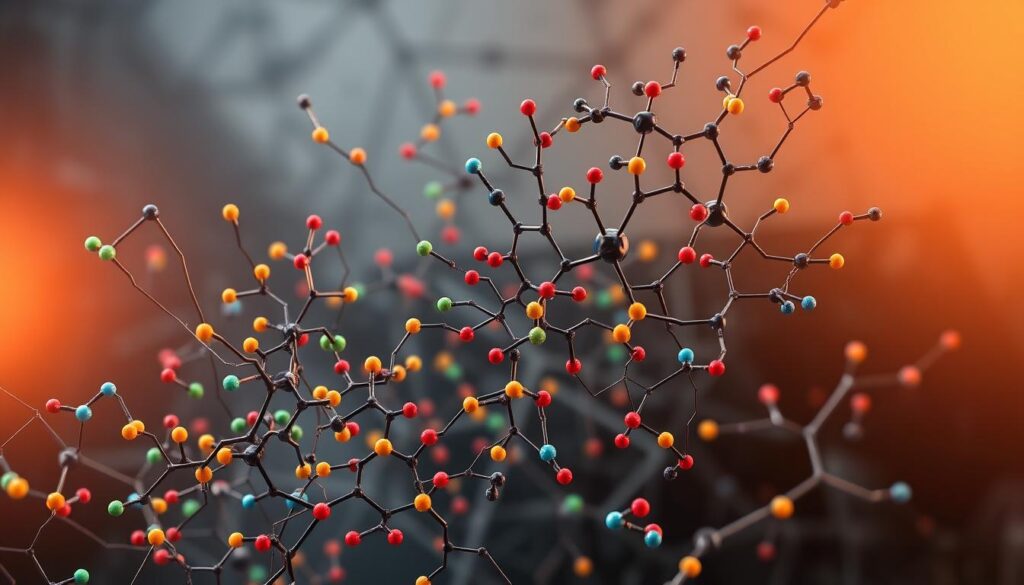How often do we consider the profound impact that our diet has on our mental health?
While many of us are aware of the physical benefits of good nutrition the link between what we eat and our mental well being often goes unnoticed.
Yet it’s crucial to understand that maintaining a healthy lifestyle through balanced nutrition plays a significant role in managing mood and overall wellness. Imagine the potential boost in happiness and mental clarity simply by making mindful dietary choices!
Key Takeaways
- What you eat can significantly impact your mental health.
- Balanced nutrition is essential for emotional well-being and happiness.
- Maintaining a healthy lifestyle involves making mindful dietary choices.
- Managing mood through nutrition is a vital part of overall wellness strategies.
- Understanding the connection between food and mental health can lead to better mental clarity.
The Impact of Diet on Mental Health
Emerging research highlights the profound connection between the food we consume and our mental well-being. Understanding how a well balanced diet affects psychological functions can empower individuals to make healthier choices that enhance their mental health.

The Role of Nutrients
Essential nutrients play a crucial role in maintaining optimal brain function. For instance omega-3 fatty acids found in fish and flaxseed are known to support cognitive health.
Vitamins B and D are equally important contributing to neurotransmitter synthesis and mood regulation. By integrating these nutrients into your daily diet you can effectively bolster your mental health.
Linking Mood and Food
The food-mood connection is supported by numerous studies indicating that individuals who consume a diet rich in whole grains fruits, and vegetables report better mental health outcomes. These healthy food choices are often associated with lower rates of depression and anxiety.
Conversely diets high in processed foods and sugars can exacerbate mental health issues. Therefore, mindful eating and selfcare are vital to maintaining balanced mental health.
Remember when it comes to mental health matters the choices we make in our diet are fundamentally significant.
How Nutritional Deficiencies Affect Mental Health
The impact of nutritional deficiencies on mental health extends beyond just physical health. Lack of essential nutrients can have profound effects on brain function mood stability, and overall emotional well-being. Understanding how these deficiencies influence our mind and emotions is crucial for maintaining mental health.
Nutrient Deficiency and Brain Function
Brain function heavily relies on a steady supply of vital nutrients. Carbohydrates are essential for providing glucose which serves as the primary fuel for the brain. Deficiencies in carbohydrates can lead to brain fog and impaired cognitive abilities.
Adequate fats especially omega-3 fatty acids found in fish like salmon and nuts, support brain cell membrane integrity and communication between neurons. Insufficient intake of these fats can disrupt brain function and contribute to mental health issues.
Proteins broken down into amino acids, are crucial for neurotransmitter synthesis, influencing mood and cognition. A diet lacking in these nutrients can impair brain function leading to mental fatigue and other cognitive challenges.
The Connection Between Low Mood and Missing Nutrients
Nutritional deficiencies can manifest in emotional imbalances and low mood. For instance a deficiency in vitamin B12 or folic acid which are vital for producing serotonin and dopamine can result in increased anxiety and depression. Vitamins like D obtained from sunlight and fortified foods have a direct link to regulating mood.
People with low levels of vitamin D often report experiencing low mood or increased symptoms of depression. Iron deficiency can also lead to anemia, characterized by extreme fatigue and low mood. Ensuring a diet rich in these essential nutrients can help ward off such mental health concerns.

Read more: The Gut Brain Connection Nutrition
| Nutrient | Role in Brain Function | Impact of Deficiency |
|---|---|---|
| Carbohydrates | Primary fuel source for the brain | Brain fog impaired cognitive abilities |
| Fats Omega-3s | Support cell membrane integrity and communication | Disrupted brain function mood disorders |
| Proteins | Neurotransmitter synthesis | Mental fatigue impaired cognition |
| Vitamin B12 and Folic Acid | Serotonin and dopamine production | Increased anxiety depression |
| Vitamin D | Mood regulation | Increased symptoms of depression low mood |
| Iron | Oxygen transport, energy levels | Anemia, extreme fatigue, low mood |
Incorporating nutrient-rich foods into your diet is essential for mental health. Ensuring that your meals are balanced and include all necessary nutrients can help maintain brain function and stabilize mood, thus fostering overall emotional well-being.
Mental Health Nutrition Biochemical Links
Understanding the intricate connection between mental health and nutrition requires diving into the biochemical links that form the foundation of our brain’s functionality. Various nutrients play pivotal roles in influencing neurotransmitter activity which directly affects mood and stress responses.
For instance, amino acids found in proteins are the building blocks for neurotransmitters like serotonin and dopamine. These neurotransmitters are crucial for regulating mood sleep, and anxiety levels.
Consuming foods rich in these amino acids can positively impact mental health by ensuring sufficient production of these chemical messengers.

Read more: Effective Mental Health Tips for Daily Wellbeing
Another significant factor lies in the consumption of omega-3 fatty acids predominantly found in fish, flaxseeds, and walnuts.
Omega-3s are known to reduce inflammation in the brain, which has been linked to improved mental health. Studies have shown that people with higher intake of omega-3 fatty acids tend to exhibit lower levels of depression and anxiety.
Additionally vitamins and minerals such as B vitamins, magnesium, and zinc actively participate in various biochemical processes that bolster mental health. B vitamins, for example aid in the production of energy within brain cells while magnesium helps modulate the nervous system to foster relaxation and decrease stress.
A balanced diet rich in diverse nutrients can create a favorable environment for the brain to perform at its best, underscoring the importance of nutrition in maintaining optimal mental health.
The Psychological Impact of Restrictive Eating
Restrictive eating can have significant and profound effects on an individual’s mental well-being. While pursuing certain dietary goals many people don’t realize the potential psychological impact of cutting out major food groups.
Nutrient deficiencies can lead to mental health issues such as depression and anxiety underscoring the importance of a balanced diet.
Additionally, the emotional burden of constantly monitoring food intake can elevate stress levels. The mental strain associated with restrictive eating patterns can lead to a diminished quality of life and impaired daily functioning.
When psychological stress is compounded with physical deficiencies it can create a vicious cycle that is difficult to break.
A well-rounded diet is crucial for sustaining mental well-being. By providing your brain with the necessary nutrients you bolster your mental resilience and overall psychological health. Therefore it’s essential to consider the broad and often overlooked effects of restrictive eating on both the body and the mind.
Eating for Emotional Well being
Our emotional well-being is deeply intertwined with the foods we consume. The concept of You are what you eat takes on new meaning when we explore how certain foods affect our mood and emotional health.
Foods That Boost Mood
There are several foods that boost mood and contribute positively to emotional well-being. Consuming foods rich in Omega-3 fatty acids like salmon and walnuts helps maintain mental health and alleviate depressive symptoms. Additionally, dark chocolate has been found to enhance serotonin levels offering a quick mood lift.
| Nutrient | Benefits | Sources |
|---|---|---|
| Omega-3 Fatty Acids | Reduces symptoms of depression | Salmon, Walnuts |
| Serotonin-Boosting Compounds | Improves mood and emotional well-being | Dark Chocolate, Bananas |
| Magnesium | Helps with relaxation and reduces anxiety | Leafy Greens, Almonds |

Read more: Omega-3 Fatty Acids
The Comfort Food Debate
The role of comfort food in emotional well-being is often debated. Comfort foods like mac and cheese ice cream, and mashed potatoes are typically high in carbs and fats which can rapidly elevate mood. However relying on comfort food can lead to unhealthy eating patterns and negatively impact long term emotional health.
In essence, while comfort food can provide temporary pleasure it is essential to balance it with nutritious foods that boost mood sustainably. Opting for healthier comfort foods such as a warm bowl of oatmeal topped with fruit can offer emotional support while contributing positively to emotional well-being.
Remember strategic food choices can significantly enhance our mood and overall mental health. By mindfully incorporating foods that boost mood and moderating comfort food intake we can achieve a balanced emotional well-being.
Prominent Diets and Their Effects on Mental Health
The connection between prominent diets and their effects on mental health is increasingly gaining attention.
From the Mediterranean diet to ketogenic and plant-based diets each shows a distinct influence on both physical and mental well-being.
The Mediterranean diet rich in fruits vegetables, and healthy fats has been particularly noted for its positive impact on mood and overall mental health. Its emphasis on whole foods and minimal processing is believed to contribute significantly to emotional stability and reduced risk of depression.
On the other hand, diet trends like the ketogenic diet, which focuses on high fat and low carbohydrate intake have gained popularity for their weight loss and cognitive benefits. Studies suggest that this diet may enhance mental clarity and reduce anxiety for some individuals.
However it’s crucial to note that such rigorous diets may not be suitable for everyone and could potentially lead to nutrient deficiencies if not properly managed.
Comparing these two prominent diets highlights the varied effects they can have on mental health:
| Diet Type | Potential Mental Health Benefits | Potential Mental Health Risks |
|---|---|---|
| Mediterranean Diet | Improved mood reduced depression, emotional stability | None known if well-balanced |
| Ketogenic Diet | Enhanced mental clarity, reduced anxiety | Possible nutrient deficiencies, increased stress |
Understanding these effects on mental health can guide individuals in choosing a diet that supports not just their physical health but also their emotional and psychological well-being. As diet trends continue to evolve, staying informed can help individuals make better choices for their mental health.
Holistic Approaches to Mental Health Nutrition
Holistic approaches to mental health and nutrition encompass a broad spectrum of strategies that integrate various lifestyle choices. A significant component of these approaches is mindful eating, which emphasizes the relationship between food choices and overall mental well-being.
Incorporating Mindful Eating
Mindful eating is a practice that fosters awareness of our eating experiences and how different foods affect our mental health. By savoring each bite and paying attention to hunger cues mindful eating encourages a positive relationship with food reducing stress and enhancing satisfaction.
This approach not only supports better digestion but also promotes emotional balance.
Combining Dietary Choices with Other Wellness Practices
Integrating dietary choices with other wellness practices such as exercise and meditation further enhances mental health. For instance, regular physical activity and nutritious meals work synergistically to reduce anxiety and improve mood.
Incorporating wellness practices like yoga or mindfulness meditation alongside balanced nutrition creates a comprehensive regimen for fostering both physical and mental health.
By adopting holistic approaches individuals can achieve a more sustainable and impactful improvement in their mental health and overall well-being.
Case Studies Real Life Benefits of Nutrition on Mental Health
In recent years, numerous case studies have highlighted the real-life benefits of nutrition on mental health. One compelling example is the significant improvement observed in individuals suffering from depression after incorporating a Mediterranean diet rich in fruits, vegetables, and healthy fats.
Research conducted by Felice Jacka and her team at Deakin University provides strong evidence of the nutritional impact on mental health. In their study, participants who adhered to a balanced diet reported remarkable enhancements in mood and overall well-being.
Additionally, various case studies support the notion that dietary changes can reduce symptoms of anxiety. For instance individuals who consume Omega-3 fatty acids commonly found in fish, nuts, and seeds, experience reduced anxiety levels and improved clarity of thought.
Here are some key findings from these case studies:
| Study | Dietary Changes | Mental Health Benefits |
|---|---|---|
| Deakin University’s SMILES Trial | Mediterranean diet | Decreased depression symptoms |
| Antioch University’s Omega-3 Study | Increased Omega-3 intake | Reduced anxiety and improved mood |
| Harvard’s Nutritional Psychiatry Research | Balanced diet rich in vitamins and minerals | Enhanced cognitive function and mood stability |
These transformative real-life benefits underscore the profound nutritional impact on mental health, prompting a shift towards integrating dietary adjustments as a viable approach to mental well-being.
Conclusion
The exploration into the connection between mental health and nutrition has revealed a fundamental truth a balanced diet plays a crucial role in mental health improvement. By incorporating nutrient-rich foods into your daily regimen you can significantly enhance your mental well-being and overall quality of life.
Throughout this article we’ve delved into the profound impact of various nutrients on brain function the psychological consequences of restrictive eating, and the role specific diets play in emotional well-being. From case studies to holistic approaches, the evidence underscores the power of a balanced diet in supporting mental health.
In conclusion it’s essential to recognize that mental health and nutrition are deeply intertwined. By continuing to explore and educate ourselves on this vital area of wellness, we can make informed decisions that promote a healthier happier mind.
Whether through mindful eating or adopting specific nutritional strategies, prioritizing a balanced diet is a pivotal step towards long-term mental health improvement.





